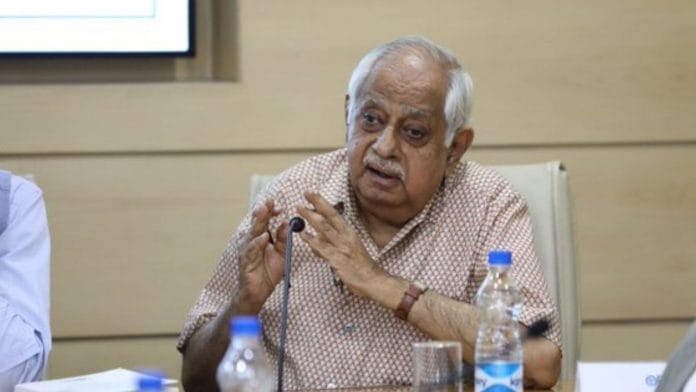New Delhi: “The soul of discretion” and a man of “sharp intellect” — these are some of the words used to describe late diplomat Satinder Lambah in diplomatic circles.
Lambah, known as ‘Sati’ by close friends and colleagues, passed away Thursday night at the age of 80 after remaining ill for about a year.
Entering the Indian Foreign Service in 1964, he served in several missions abroad, namely as the High Commissioner of India to Pakistan (1992-95) and Ambassador of India to Russia (1998-2001). He had also helped open the Indian Embassy in Dhaka after Bangladesh’s liberation.
It was after his retirement in 2001, however, that he served in even more critical positions. The veteran diplomat was hand-picked by the Manmohan Singh-led government as special envoy to Afghanistan from 2001-02.
In a 2017 interview, when asked if India should be given a greater role in the Afghan peace process at the time, he had remarked, “India does not need anyone to give it a role in Afghanistan. It plays a role by virtue of its history, by virtue of its contacts. This was simply taken away during the Taliban administration, which was a difficult period. But except for that, we have had excellent relations with Afghanistan.”
Lambah was also a key negotiator in the backchannel diplomatic process between India and Pakistan from 2005-2014, when bilateral relations saw a thaw. The diplomat was, in fact, born in Peshawar (now in Pakistan) on 16 July 1941.
When former PM Manmohan Singh was on his way out in 2014, it was reported that he had handed over a draft agreement on Jammu and Kashmir to incoming PM Narendra Modi, which was the product of 30 secret meetings held by Lambah and his Pakistani counterpart Tariq Aziz.
“He was also the soul of discretion. When asked about his back-channel talks with Pakistan, he would say disarmingly that the prime minister had asked him to safeguard its confidential contents. He had an excellent sense of humour, and was a great conversationalist,” former ambassador Kishan Rana, who had previously served in missions in Algeria, Mauritius, Germany and others, told ThePrint.
“Satinder was generous to all his friends and always positive and thoughtful in his remarks. His huge circle of friends will miss him greatly,” added Rana.
Also read: What G7’s $600-bn infra alliance focussing on healthcare, climate security means for India
‘Lambah & wife were parental figures for embassies’
Arun Kumar Singh, Lambah’s colleague and a former US ambassador to India, had worked with him closely on three occasions.
“First, in the late ’90s when he was ambassador in Moscow. We had to deal with the fallout of the Kargil conflict, and then the transition from (former Russian President Boris) Yeltsin to (Vladimir) Putin. Second, when he was special envoy for Afghanistan in the post 9/11 period, where we worked to re-establish the Indian embassy in Kabul and start our highly effective assistance program and other outreach in Afghanistan,” Singh told ThePrint.
The two had also worked together when Singh was posted in Washington from 2008-13 and then from 2015-2016.
“He was an important part of the Delhi-based think tank Ananta Aspen Centre which played a useful role in discussing and disseminating norms and parameters for the post 2008 India-US relationship,” said Singh.
He added, “Lambah had a sharp intellect, the ability to deal effectively with interlocutors and always enthused his own team to do even more than what they thought they were capable of. Both he and his wife were mentors and parental figures for the embassies they led.”
Lambah’s wife, Nilima, has famously noted down her experiences as the wife of a diplomat in a book titled ‘A Life Across Three Continents—Recollections of a Diplomat’s Wife’. When Lambah was serving as the Indian High Commissioner to Pakistan in the ’90s, she recalled how local women would keep a distance from her.
“Being the wife of an Indian diplomat in Pakistan was an experience in itself. Initially, I found the manners of local ladies at official functions sadly wanting. Scared to be seen talking to an Indian in public, some would hastily move away on being introduced, making me feel like a pariah. Others, more refined and worldly, would spend a little time talking before making themselves scarce.
“With the passage of time, I came to accept this as a part of life in Islamabad. Their surprised, ‘You are Indian, but you look just like us’, always astonished me. We were part of the same subcontinent, and had been part of the same country till only three decades earlier, so how different could we be?” she wrote.
Lambah is survived by his wife and two children.
Also read: India-China row ‘not set in stone’, economic asymmetry among Galwan triggers, says Shyam Saran






